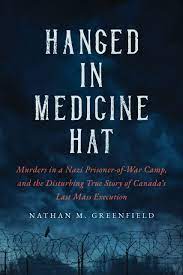Recently, the Globe and Mail ran an interesting Op-Ed piece by Canadian military historian , Dr. Nathan Greenfield, Ph.D. Dr. Greenfield has written previously about prisoners of war (PW), from various countries, during the Second World War. His recent Op-Ed was presented to publicize his latest book: Hanged in Medicine Hat: Murders in a Nazi Prisoner-of-War Camp, and the Disturbing True Story of Canada’s Last Mass Execution (Toronto: Sutherland House, 9 November 2022).
An historian and journalist, Dr. Greenfield offers an intriguing tale that, for some readers, may call to mind the 1990 made-for-TV movie starring the late Walter Matthau: "The Incident". And Dr. Greenfield's book offers a much more complex tale that is both true and presents challenging ethical and legal dilemmas.
While I am inclined to dispute the definitive manner in which Dr. Greenfield asserts that the trial of Nazi PWs, charged with murdering a couple of their fellow PWs, was a miscarriage of justice, his Op-Ed (and, presumably, book) raise interesting questions about the application of military law, in Canada, during the Second World War. His conclusion that the PWs should have been tried by court martial does not necessarily result in a miscarriage of justice. While the Crown in Canada could have relied upon military law to try the accused, even then, the jurisdiction of civil courts of criminal jurisdiction was concurrent.
One might be inclined to compare the cases to the trial of Kurt Meyer for war crimes. Meyer was tried before a court martial, an appropriate tribunal when an enemy combatant is held by a belligerent nation, for the murders of Canadian soldiers at the Abbaye d'Ardenne (Ardenne Abbey). However, Meyer was tried for war crimes committed, in Europe, before he was captured.
I would also suggest that the 'patriotic motive' advanced by lawyers for the accused was of dubious merit, in 1940s Canada or presently. The circumstances giving rise to the actions of the accused may have been worthy of consideration as mitigating factors.
Notwithstanding whether one might disagree with some of Dr. Greenfield's conclusions regarding the justness of the civil trial, he offers a well-researched and intriguing examination of a provocative tale in Canadian military history.

No comments:
Post a Comment
Comments are subject to moderation and must be submitted under your real name. Anonymous comments will not be posted (even though the form seems to permit them).